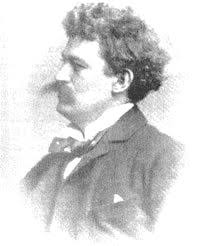
H. B. Marriott Watson
Henry Brereton Marriott Watson (20 December 1863 - 30 October 1921), known by his pen name H. B. Marriott Watson, was an Australian-born British novelist, journalist, playwright, and short-story writer. He worked for the St. James Gazette, was assistant editor of the Black and White and Pall Mall Gazette, and staff member on W. E. Henley's National Observer. Marriott Watson was a popular author during his lifetime, best known for his swashbuckling, historical and romance fiction, and had over forty novels published between 1888 and 1919; these included seventeen short story collections and one collection of essays. He was a longtime resident of New Zealand, living there from 1872 to 1885, and often used his childhood home as the setting for many of his novels. He and his common law wife, English poet Rosamund Marriott Watson, were well known in Britain's literary circles and were associated with many fellow writers of the period including J. M. Barrie, Stephen Crane, Thomas Hardy, Henry James and H. G. Wells among others. Their first and only son, Richard Marriott Watson, was also a noted poet and one of many sons of literary figures killed during the First World War. Although now largely forgotten, Marriott Watson's contribution to Gothic horror during the latter part of the nineteenth century is notable for its romantic decadence. The stories which appeared in such collections as Diogenes of London (1893) and The Heart of Miranda (1898) bear favourable comparison with those produced by fellow contemporaries Arthur Machen, Vincent O'Sullivan and M. P. Shiel. Henry Brereton Marriott Watson was born in Caulfield, Melbourne, Australia to Henry Crocker Marriott Watson and Annie McDonald Wright. His father was an Anglican priest and spent nine years traveling with him as he took up various ministries throughout Victoria. He and his family moved to New Zealand in 1872 when his father accepted a position at St John's in Christchurch. Marriott Watson spent much of his childhood there and would later use it as a setting for many of his novels.


